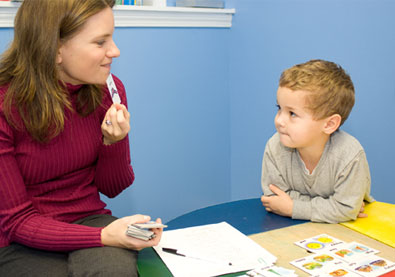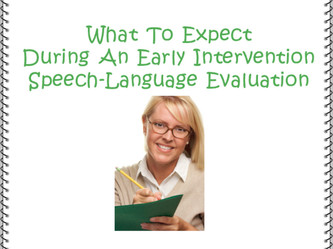Help! My Child Isn’t Reaching Communication Milestones

Image Courtesy of speechandot.com
Are you worried about your preschooler or kindergartener? Maybe there have been signs that something is just not quite right with her communication skills, or her preschool teacher has mentioned she isn’t reaching typical communication milestones just yet. You’ve maybe even heard that it is “just a phase” or that your child will “catch up” with the other kids her age. While every child is an individual and will make progress at his or her own unique pace, it is also important to listen to those gut feelings and inner voices you have that something might be causing this delay.
Developmental Communication Milestones in the Early Years
Whether or not you suspect a problem or challenge for your child you should be aware of the developmental communication milestones that exist for his or her age group. These early years are usually a time of great strides, especially towards academic skill building. The foundations of writing, reading, and more comprehensive conversation skills are just some aspects of communication milestones that should begin to be reached during these years.
I Think There Is A Problem – What Do I Do?
After you’ve taken an assessment of age-appropriate milestones, ask yourself some of these questions about your child’s personal development. It is important to start with how you and your family see your child developing because you are the ones who spend the most time with him or her, and are likely to be the most in tune with her development and how it affects daily life. Address your concerns with your child’s pediatrician or healthcare provider, as well as any preschool or kindergarten teachers or staff members. There are many resources available to help diagnose developmental communication delays or disorders.
Teachers
If your child has been attending preschool or kindergarten, talk with his or her teachers about communication milestones that might not be met. Sometimes these professionals have procedures in place to work as a team with school SLP’s to evaluate and form plans for helping students.
Healthcare Providers
If your child isn’t meeting communication milestones as expected, it can be the sign of an individual communication delay, or it may be a symptom of a larger problem. Communication delays and disorders can be present as parts of other sometimes more serious disorders or disabilities. Autism, a brain injury causing apraxia of speech, and dysarthria (oral muscle weakness) are just some conditions that can cause children to have communication delays but that represent a larger health issue. Children should have a complete health physical to look for any underlying causes behind lagging communication milestones.
Speech-Language Pathologists (SLPs)
While your healthcare provider is an important partner in caring for your child, evaluations by SLPs can be invaluable to diagnosing communication delays. Sometimes your healthcare provider will suggest that you seek further evaluation, but you don’t need a referral from a physician for many of these programs. You can seek an evaluation on your own, or your child’s preschool or kindergarten program might have SLPs available for early childhood screening and intervention. Sometimes in early intervention a home visit is done to assess the child. Most assessments will include some of the following:
- A comprehensive discussion of what you (the parent) see as challenges for your child reaching communication milestones
- Interaction between your child and the SLP through play as the SLP gets to know your child more
- A more formal assessment, but even this is usually play-based, that evaluates, literacy, articulation, voice quality, fluency, oral motor skills, and more
Audiologists
Image Courtesy of visual.lyAn important part of communication is the hearing, so it is natural to often have an assessment by an audiologist. This professional will do more extensive testing than the typical baseline hearing test that might be done in your child’s kindergarten class or pediatrician’s office.
Ophthalmologists
Vision plays a role in communication, especially when it comes to reading, writing, and even some non-verbal communication skills. A thorough eye exam can help diagnose any contributing visual factors as to why your child isn’t reaching communication milestones.
The results of assessments by these various professionals will help give you direction to help your young child. Combinations of speech, occupational, music, play, or other therapies can help to reduce or resolve some symptoms depending on the causes and severity. As you learn more about your child’s challenges, you’ll become better equipped to help your child meet as many communication milestones as possible.



